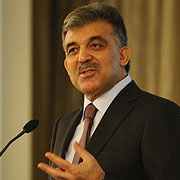Syrian President Bashar al-Assad has ignored repeated pleas from Turkey to reform, the Turkish president said, lamenting that Syria is now on a path of no return, Today's Zaman reported.
"Some think that we want war in Syria. Turkey has done everything in its power for a transformation under the leadership of the president. We did everything except beg for it," Gul told reporters in remarks published in Turkish newspapers on Tuesday. "We worked so hard [to convince Assad]. We told him that one day you will regret it, one day you will say, 'I did this and that, but it will be too little, too late," said Gul.
"We regret this, but Syria is unfortunately on a path of no return. The important thing is that this process is not dragged out. There is no [good] end for this. The end is certain. The question is how painful it will be," the president also said.
The president said authoritarian rulers in the Middle East have two options, which he said are either carry out reforms or face foreign intervention. "If they do not do that and do not bring order to their lands, foreign intervention will be inevitable," he said.
The president was also asked about the comments that the region has been dominated by Iran during the interview. He played down an alleged Turkey-Iran rivalry in the Middle East. "Of course, the region has some realities. ... Iran's hinterland is so broad. Ignoring this means lack of historical knowledge. ... Just like we have [historical] ties [to some countries] in the region, Iran also has similar ties," he said.
'Freedom of the press requires careful protection'
Commenting on domestic issues, President Gul said freedom of the press is an asset of democracy that should be protected most meticulously while warning that failure to protect this freedom will undermine Turkey's achievements in other fields.
"This [freedom of thought, freedom of the press and human rights] is the area that Turkey should protect most meticulously. If this area is sullied, no matter what you do in other fields, they [those accomplishments] will be of no value. We, the whole of Turkey, should pay close attention to this," Gul told reporters.
The president's remarks came in response to a question about journalists Nedim Sener and Ahmet Sık, who are in jail in connection with a case against Odatv and face charges over membership in Ergenekon, a shadowy crime network that has alleged links to the state and is suspected to plotting to topple the government. An İstanbul court decided last week to keep Sener and Sık in jail despite expectations about their release.
Gul indicated although he is not fully aware of the details of the case against Sık and Sener, his general position about freedom of the press is obvious as he has voiced his views on the trial of these journalists since the very beginning.
The president was referring to remarks published by the Milliyet daily before the beginning of the trial of Sık and Sener last year. Back then, Gul said: "When I follow the developments, I get the impression there are some developments that disturb the public's sense of justice. I expect the judges and prosecutors to behave more responsibly in fulfilling their responsibilities and not to damage the honor and rights of the people."
Gul was also asked about an investigation into the killing of 34 civilians in Turkey's Southeast by a Turkish Armed Forces (TSK) airstrike in December.
Turkish warplanes mistakenly killed 34 smugglers in an operation that targeted outlawed Kurdistan Workers' Party (PKK) terrorists in Iraq in late December. The government later acknowledged that the victims were smugglers, not terrorists. The military issued a statement saying the warplanes had targeted the group based on intelligence that suggested a group of armed terrorists would be heading towards the Turkish border to stage attacks on the military.
"There are already four to five ongoing investigations into Uludere. There is ongoing, meticulous work. Many nongovernmental organizations, political parties and the Turkish Parliament's Human Rights Investigation Commission all follow the developments -- they come together [to discuss developments in the Uludere investigations]. I have of course received information from the chief of General Staff regarding the Uludere incident. We talked about the issue at length," said Gul.
The president also commented on the French Senate's vote on a controversial bill last week to make it a crime to deny the 1915 killings of Armenians was genocide and said France lost prestige with this move.
"This incident [the bill being passed] has echoed strongly in France and throughout the entire world. If you ask why this is so. It is because people may think differently on an issue. They may think in a way that is unacceptable -- unthinkable -- for us. We may think differently from them. The important thing is not to ban thought. Now, France has banned thought. It has banned thoughts that conflict with the official view of the state. In a way unexpected by the French, France has lost prestige," explained Gul.






